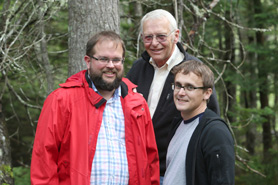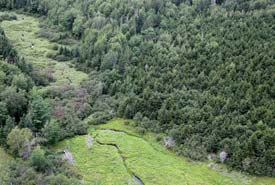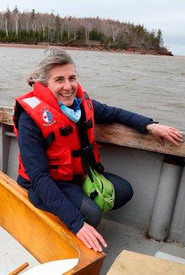From woodsman to grandsons to Canadians

Alan Bonnyman and his two sons (Photo by Mike Dembeck)
Whether they live in big cities or small villages, Canadians often see their identity as defined by nature: by our dramatic seasons, by the sheer size of our country and by living near oceans, rivers, lakes, mountains, prairies and forests. This shared connection to nature is one of the reasons why the Nature Conservancy of Canada (NCC) regularly receives incredible gifts from individuals and families who want to leave a legacy of land.
On Earth Day 2016, the Nature Conservancy of Canada celebrated one such gift in Nova Scotia: a donation of 416 acres (167 hectares) of forest, which includes more than 600 mature and extremely rare eastern white cedar trees. The gift was from Bonnyman and Byers, a family owned forestry company.
“My father bought the land in the late 1960s,” explains Alan Bonnyman, owner of Bonnyman and Byers. “He bought properties to supply his sawmill, but the cedars were never cut. He had no formal training, but he had an appreciation for how things should be done and he always did selective logging. My father was a man of few words, and I didn’t realize the cedars were there until after he died, about 10 years ago.”
Bonnyman, who has been working in forestry most of his life, says the cedars not only look different from the surrounding forest; they feel different. “You can feel it on your skin. In the cedar stand, it tends to be a little damper, because they like to grow on damper ground. Hemlock is cool, pine is dry and cedar feels damp.”

Docherty's Brook, NS (Photo by Mike Dembeck)
Alan Bonnyman says once they were discovered, the cedars became a topic of discussion with his two sons, who are working toward taking over the family forestry business. They agreed their grandfather had been right to spare the trees, and all three decided the trees should remain untouched.
“We struggled as a family as to what to do,” recalls Bonnyman. “We decided it doesn’t matter whose name is on the deed if the trees are never going to be cut. And we thought a national organization, like NCC, could manage it better than we could. The boys saw this as an opportunity to share something.”
And share they did. The Bonnymans’ 416 acres (167 hectares) of forest is now owned by the Nature Conservancy of Canada. The property includes black ash, which like eastern white cedar, is listed as species at risk in Nova Scotia. Because of the value of the rare species and biodiversity on the property, verified by NCC’s conservation biologists, it qualified for a charitable tax receipt under the federal government’s EcoGifts program.
The property was also secured thanks to support from the TD Forests program.
“More than 90 percent of Canadians have said forests are important to them, and for good reason. Forests form the backdrop of our communities, where we live, work and play — and they perform an essential role in cleaning the air and moderating temperatures,” said Karen Clarke-Whistler, chief environment officer for TD Bank Group. “As our world becomes more urbanized it is essential to protect forests and the valuable habitats they represent. That’s why we made protecting critical forest habitat a key pillar of the TD Forests program.”
The land donated by the Bonnymans is now connected to larger areas being protected by the Nature Conservancy of Canada and the Province of Nova Scotia, and will be permanently conserved for wildlife and people to enjoy far into the future.
This post originally appeared in the Globe and Mail and was produced with the support of Randall Anthony Communications Inc.


